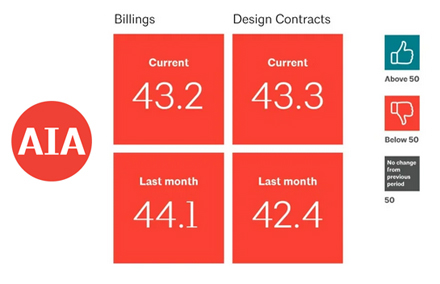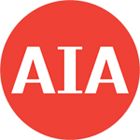AIA Billings Index Continues Decline In April

Washington, DC – The AIA/Deltek
Architecture Billings Index (ABI) dropped to 43.2 in April, down from
44.1 in March. This decline reflects an accelerated decrease in billing
activity.
Billings have decreased in 28 out of the past 31 months,
following their initial drop into negative territory after the
post-pandemic boom. New project inquiries decreased for the third month
in a row in April, and the value of new design contracts has declined at
the majority of firms for 14 consecutive months.
“Uncertainty as
to the economic outlook continues to hold back progress on new
construction projects,” said Kermit Baker, PhD, AIA Chief Economist.
“Despite the slowdown in billing activity, architecture firms continue
to navigate this business cycle quite effectively, as staffing at firms
remains relatively stable and project backlogs are holding up better
than expected.”
Key ABI highlights for April include:
• Regional averages: South (46.2); Midwest (44.4); West (42.1); Northeast (40.2)
•
Sector index breakdown: institutional (46.3); mixed practice (firms
that do not have at least half of their billings in any one other
category) (47.6); commercial/industrial (40.5); multifamily residential
(40.8)
• Project inquiries index: 48.0
• Design contracts index: 43.3
The
regional and sector categories are calculated as three-month moving
averages and may not always average out to the national score.
About The American Institute Of Architects
 For over 150 years, members of the American Institute of Architects have worked with each other and their communities to create more valuable, healthy, secure, and sustainable buildings and cityscapes. Members adhere to a code of ethics and professional conduct to ensure the highest standards in professional practice. Embracing their responsibility to serve society, AIA members engage civic and government leaders and the public in helping find needed solutions to pressing issues facing our communities, institutions, nation and world. For more information, visit www.aia.org.
For over 150 years, members of the American Institute of Architects have worked with each other and their communities to create more valuable, healthy, secure, and sustainable buildings and cityscapes. Members adhere to a code of ethics and professional conduct to ensure the highest standards in professional practice. Embracing their responsibility to serve society, AIA members engage civic and government leaders and the public in helping find needed solutions to pressing issues facing our communities, institutions, nation and world. For more information, visit www.aia.org.